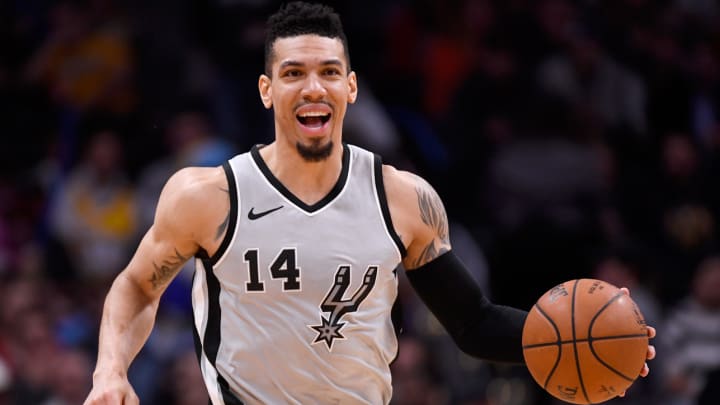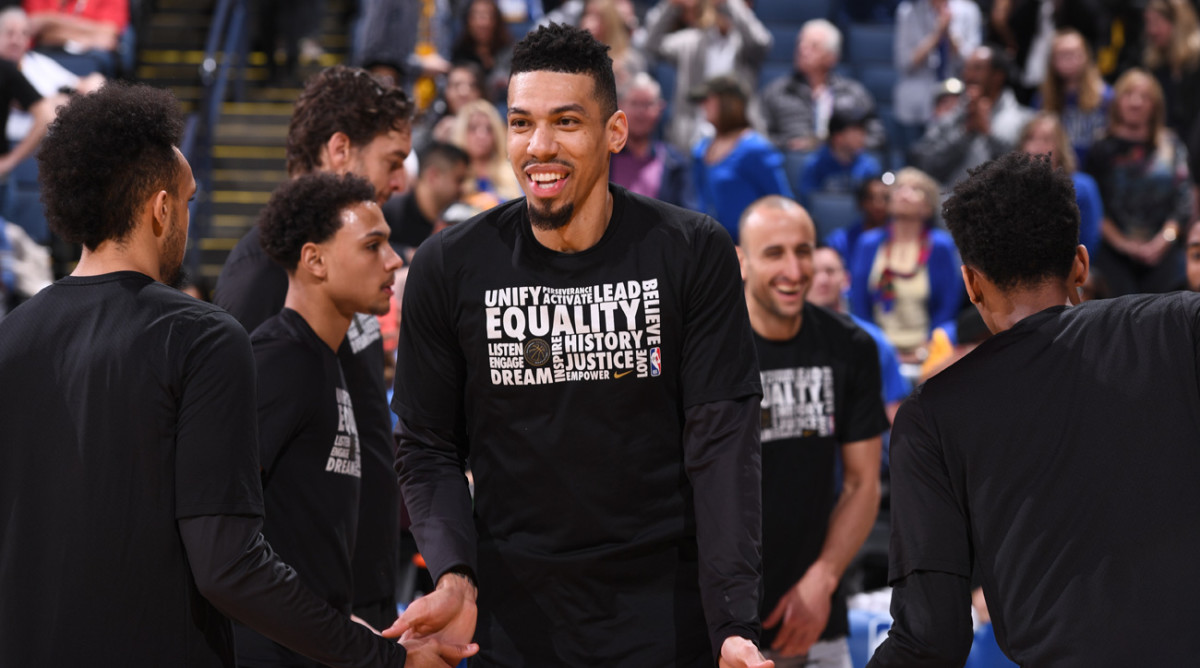Danny Green Q&A: Journey to the NBA, Playing for Coach Pop and Pet Snakes

Spurs guard Danny Green has a specific way of striking fear into opponents. His automatic three-point shooting often has defenders looking helplessly frustrated while he’s simply rising up, let alone before the shot even goes in. Green insists, however, that shooting is not the only way he can impact a basketball game.
“I am capable of dribbling the ball. I can dribble,” Green told The Crossover earlier this month. “And I can play a little defense!”
Green has become an essential cog in the Spurs machine—for his shooting, dribbling and defense—since breaking out against the Heat in the 2013 NBA Finals. Now in his eighth season in San Antonio, it can be easy to forget how lethal Green’s shooting is when the Spurs spread the floor, or how effective his perimeter defense is against some of the game’s best players.
The Crossover caught up with Green to discuss—in addition to his dribbling skills—his journey to NBA stability, playing for Gregg Popovich, pet snakes and more.

Rohan Nadkarni:How frustrating is it not having Kawhi Leonard on the court? What challenges does that create?
Danny Green: There are games when you realize you could use a closer, especially at the end of tight games. Most of the season we’ve grown accustomed to it. It’s nothing new to us. We could definitely use this guy, but we’ve had to get that out of our heads and learn to play without him. I’m sure it’s more frustrating for him than anybody. To not be able to be on the floor and compete the way he wants. We’re just wishing him the best and hoping for good health and that he comes back faster than normal. But we have to move forward and not worry about him being here.
RN:Tell us what the experience is like playing for Pop.
DG: We’re intense on the court. Off the court, very laid back, genuine. Likes to talk about politics, what’s going on. Basketball is just a game, and it’s great. We’re lucky to play it for our jobs. But there’s a lot more important things going on in the world, and Pop likes to keep us informed. He’s a very genuine person and he cares about all of us like family. But on the court, he’s very intense. He can’t be expected to be laid back there as well. It comes down to business. It’s all about appropriate fear and taking it dead serious.
RN: What’s something you do that always gets on his nerves?
DG: There’s a lot of things actually, it’s not just one thing. Like any other human being or coach, he doesn’t like to repeat himself. If you make a mistake twice, he gets frustrated. If I turn the ball over multiple times, if I don’t get in my defensive stance, or not boxing out—those mistakes are cardinal sins in his book.
RN: You have a reputation as one of, if not the best transition defender in the league. What’s your secret to ruining so many fastbreaks?
DG: I’m not a gambling man but I’m a pretty good guesser. I get lucky. I guess sometimes, it works out for me but I think I’m just a better guesser than other people. It’s tough. It’s hard to stop a two-on-one or three-on-one. You have to anticipate and try to make somebody do something different. Or make them think you’re going to do something different. You try to make a deflection or hold them up until your teammates can catch up and help. But I think I’m just a really good guesser.
RN:How would you describe your journey to this moment in your career? People remember when you were on the Cavs, to now having that big contract and security with the Spurs.
DG: It’s been a rollercoaster ride, that’s really the only way to describe it. Coming out of college, winning a national championship, to going to my rookie year and not really playing much to not playing at all. Getting cut. Going home for two months. Playing in the D-League for a couple months. Getting signed to a team then the lockout happening. Playing overseas for a couple months. Make the team again. It’s been really up and down, but getting an opportunity to play has been a blessing. It really is a rollercoaster ride. I think the biggest thing for everybody in this league is the respect of their peers. A lot of the things we do, the way we compete, is for everybody in this league to respect as good players. Whether GMs see it or not or people on the outside, we want the respect of players.

RN: How do you know when you belong in the league? How do you know you’ve made that leap?
DG: When the game slows down for you. I’m not sure I’ve made any major leaps, I’m still trying to get better. When you’re a rookie, the game moves a 1000 miles per hour. But each year, you get more mature, the game slows down for you, and that’s when you realize you’re getting better at belonging. When you know where to go and where to be, that’s when the game is coming a little easier to you.
RN: What’s going on with your pet snake these days? How long have you had it now?
DG: I had two, actually. I got rid of one because he was a little defensive, as I would say. The other one, I’ve had her since my junior year of college, so almost nine or ten years now. She’s been great, very laid back. I’ve had my ups and downs with her, she’s almost died a couple times. She’s gone through it, but she’s still alive and kicking. Athletes travel so much, it’s not really easy to take care of a mammal. Reptiles are a little easier. Now I have a dog, I have a girlfriend who helps me take care of her. But when I was younger, I wanted a pet, but I didn’t have time to take care of a cat or dog. Reptiles are very low maintenance.
RN: How did your college friends feel about you having a snake? It just lived in your apartment?
DG: Yeah, they weren’t too fond of it. The first year we moved off campus and had a house we had a tank for it. But it was also a cool story. People always loved to see the feedings. It was a good conversation starter.
The Case for the NBA Lottery Tournament
RN: Did Roy Williams know about this?
DG: I don’t know if he knew when I first got it. He found out like a year later. He was okay with it, but he was like, “Make sure you don’t get bit!” That kind of deal.
RN: I heard you went to the NBPA’s broadcasting camp last summer. Is that something you’re interested in after your career?
DG: Definitely. I don’t think I ever want to coach but I want to stay around the game. Coaching gives people a lot of gray hairs to takes away hair. I want to be around the game but not as stressed. It was fun, it wasn’t easy, though. You look at the camera differently now. Behind the camera you see how guys do it. You kind of analyze people up there on the panel now. You see who’s really good and who’s not. You look at TV really differently now.
RN: Who are some of your favorite broadcasters?
DG: Stuart Scott is my favorite of all-time. He‘s the reason I took communication at Carolina. Now, I like a couple different guys. I like Jalen Rose and what he does. Stephen A., he talks a lot of crap sometimes but I like what he does. Max [Kellerman] backs me up a lot. And Skip, he’s an honorary alum of the Spurs. So he’s definitely a favorite. And Shannon Sharpe, he’s hilarious.
RN: You guys are really claiming Skip?
DG: I mean, he’s a Spur, man. We gotta claim him. He roots for us. He supports us. He always backs us up.
